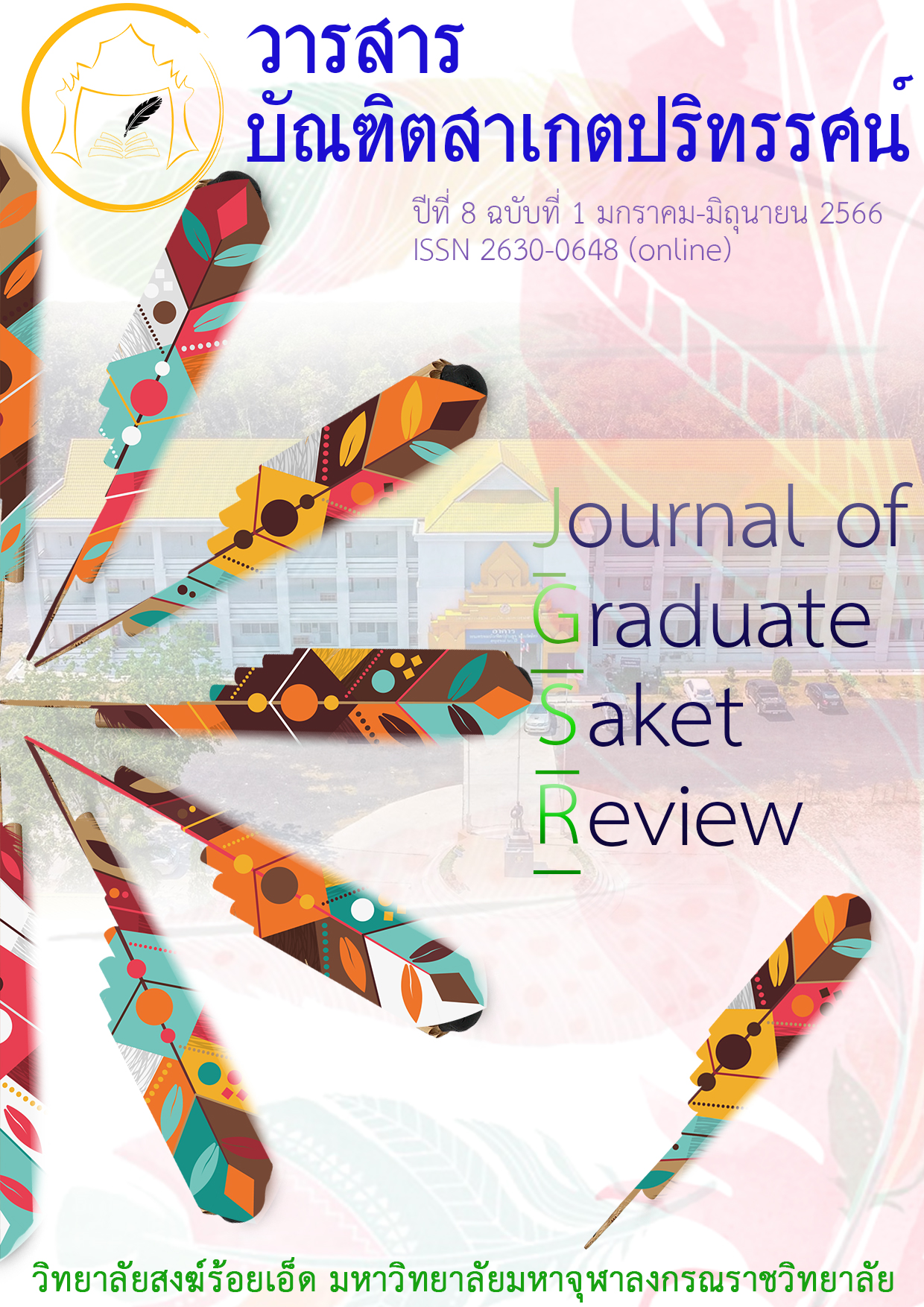การประเมินโครงการส่งเสริมการนำหลักปรัชญาของเศรษฐกิจพอเพียง สู่การจัดการเรียนรู้โรงเรียนเมืองกลางประชานุกูล ปีการศึกษา 2562 สำนักงานเขตพื้นที่การศึกษามัธยมศึกษา เขต 28
Main Article Content
บทคัดย่อ
การประเมินโครงการส่งเสริมการนำหลักปรัชญาของเศรษฐกิจพอเพียงสู่การจัดการเรียนรู้โรงเรียน มีวัตถุประสงค์ 1) ประเมินบริบทด้านความสอดคล้องของวัตถุประสงค์ของโครงการกับแผนพัฒนาเศรษฐกิจและสังคมแห่งชาติ และนโยบายการศึกษาของกระทรวงศึกษาธิการ 2)ประเมินปัจจัยนำเข้าที่ใช้ในโครงการ
3)ประเมินกระบวนการในการดำเนินการจัดกิจกรรมของโครงการ 4) ประเมินผลผลิตของโครงการ 5)ประเมินผลกระทบที่เกิดจากโครงการ ประชากรและกลุ่มตัวอย่างที่ใช้ในการดำเนินการในครั้งนี้ได้มาโดยการเลือกแบบเจาะจง (Purposive Sampling) เครื่องมือที่ใช้ในการดำเนินการเป็นแบบสอบถาม วิเคราะห์ด้วยการหาค่าความถี่ ร้อยละ ค่าเฉลี่ยส่วนเบี่ยงเบนมาตรฐาน และนำเสนอผลการวิเคราะห์ข้อมูลโดยการพรรณนาวิเคราะห์
ผลการดำเนินการ พบว่า
1. ด้านบริบท พบว่ามีความคิดเห็นเกี่ยวกับความสอดคล้องของวัตถุประสงค์ของโครงการ โดยภาพรวมอยู่ในระดับมากที่สุด
2. ด้านปัจจัยนำเข้า พบว่ามีความคิดเห็นเกี่ยวกับความเหมาะสมของปัจจัยนำเข้าของโครงการ โดยภาพรวมมีความเหมาะสมอยู่ในระดับมาก
3. ด้านกระบวนการ พบว่ามีความคิดเห็นเกี่ยวกับความพร้อมและความเหมาะสมเกี่ยวกับกระบวนการของโครงการ โดยภาพรวมมีความพร้อมและความเหมาะสมอยู่ในระดับมากที่สุด
4. ด้านผลผลิต พบว่า
4.1 นักเรียนชั้นมัธยมศึกษาปีที่ 1 ถึงชั้นมัธยมศึกษาปีที่ 6 มีผลสัมฤทธิ์ความรู้เกี่ยวกับหลักปรัชญาของเศรษฐกิจพอเพียงสูงขึ้นกว่าก่อนดำเนินโครงการอยู่ในระดับมาก
4.2 คุณลักษณะอันพึงประสงค์ของนักเรียนสูงขึ้นกว่าก่อนดำเนินโครงการอยู่ในระดับมาก
4.3 ผู้บริหาร ครูและบุคลากรทางการศึกษา นักเรียน ผู้ปกครอง และคณะกรรมการสถานศึกษาขั้นพื้นฐาน มีความพึงพอใจต่อโครงการ โดยภาพรวมอยู่ในระดับมากที่สุด
5. ด้านผลกระทบที่เกิดจากโครงการ พบว่าครูและบุคลากรทางการศึกษา นักเรียน ผู้ปกครอง และคณะกรรมการสถานศึกษาขั้นพื้นฐาน มีความคิดเห็นเกี่ยวกับความรู้ที่ได้รับจากโครงการสามารถนำไปใช้กับการปฏิบัติงานที่รับผิดชอบ
Article Details

อนุญาตภายใต้เงื่อนไข Creative Commons Attribution-NonCommercial-NoDerivatives 4.0 International License.
เนื้อหาและข้อมูลในบทความที่ลงตีพิมพ์ในวารสารบัณฑิตสาเกตปริทรรศน์ ถือเป็นข้อคิดเห็นและความรับผิดชอบของผู้เขียนบทความโดยตรงซึ่งกองบรรณาธิการวารสาร ไม่จำเป็นต้องเห็นด้วย หรือร่วมรับผิดชอบใด ๆบทความ ข้อมูล เนื้อหา รูปภาพ ฯลฯ ที่ได้รับการตีพิมพ์ในวารสารบัณฑิตสาเกตปริทรรศน์ ถือเป็นลิขสิทธิ์ของวารสารบัณฑิตสาเกตปริทรรศน์ หากบุคคลหรือหน่วยงานใดต้องการนำทั้งหมดหรือส่วนหนึ่งส่วนใดไปเผยแพร่ต่อหรือเพื่อกระทำการใด ๆ จะต้องได้รับอนุญาตเป็นลายลักอักษรจากวารสารบัณฑิตสาเกตปริทรรศน์ ก่อนเท่านั้น
เอกสารอ้างอิง
ภาษาไทย
กฤษศักดิ์ สูงมูลนาค และคณะ. (2561). การประเมินโครงการอบรมเชิงปฏิบัติการการวิจัยทางการพยาบาล กลุ่มงานการพยาบาล โรงพยาบาลพระพุทธชินราชพิษณุโลก ประจำปี 2560. การศึกษาค้นคว้าด้วยตนเอง มหาวิทยาลัยนเรศวร.
จรัสศรี พัวจินดาเนตร. (2560). กิจกรรมพื้นฐานการงานอาชีพสำหรับครู. กรุงเทพมหานคร: คณะครุศาสตร์จุฬาลงกรณ์มหาวิทยาลัย.
เธียรธิดา เหมพิพัฒน์. (2561). ความคิดเห็นของนักศึกษาสถาบันบัณฑิตพัฒนบริหารศาสตร์ต่อปรัชญา เศรษฐกิจพอเพียง. ภาคนิพนธ์ปริญญามหาบัณฑิต สถาบันบัณฑิตพัฒนบริหารศาสตร์.
ปริญญา มงคลคูณและคณะ. (2561). การประเมินโครงการเยาวชนคนดีศรีสุพรรณของโรงเรียนในจังหวัดสุพรรณบุรี. การศึกษาค้นคว้าด้วยตนเองการศึกษามหาบัณฑิต มหาวิทยาลัยนเรศวร.
พัฒนาภรณ์ ฉัตรวิโรจน์. (2555). บทบาทของครูในการส่งเสริมความรู้เศรษฐกิจพอเพียงใน โรงเรียนมัธยมศึกษาจังหวัดขอนแก่น. วิทยานิพนธ์ศึกษาศาสตรมหาบัณฑิต (สังคมวิทยาการพัฒนา) บัณฑิตวิทยาลัย มหาวิทยาลัยขอนแก่น.
ยุพิน ทองส่งเสริม. (2561). สภาพการจัดกระบวนการเรียนรู้ตามพระราชบัญญัติการศึกษาแห่งชาติ พ.ศ. 2542 ของครูโรงเรียนอาชีวเอกชน กลุ่มกรุงเทพมหานคร. วิทยานิพนธ์ครุศาสตร์ อุตสาหกรรมมหาบัณฑิต (หลักสูตรและการสอนอาชีวศึกษา) บัณฑิตวิทยาลัย สถาบันเทคโนโลยีพระจอมเกล้าคุณทหารลาดกระบัง.
วสันต์ ทองไทย. (2555). รูปแบบการเรียนการสอนเพื่อพัฒนาจิตพิสัยในการเรียนรู้สำหรับผู้เรียนระดับประถมศึกษา. วารสารวิชาการ. 8(3), 30-36.
สมบัติ กุสุมาวลี. (2549). หลักปรัชญาเศรษฐกิจพอเพียงในภาคธุรกิเอกชน : กรณีศึกษาการบริหารและพัฒนา ทรัพยากรมนุษย์และองค์การของเครือซิเมนต์ไทย. รายงานการวิจัย สำนักงานคณะกรรมการเศรษฐกิจและสังคมแห่งชาติ.
สุมน อมรวิวัฒน์. 2553.การจัดการเรียนรู้แบบเผชิญสถานการณ์. กรุงเทพฯ: ห้างหุ้นส่วนจำกัด.
สำราญ ตดิชรา. (2558). ศึกษาปัญหาการจัดการเรียนการสอนตามแนวปฏิรูปการศึกษาของครูโรงเรียนสังกัด สำนักงานเขตพื้นที่การศึกษาประถมศึกษาตราด. ปริญญานิพนธ์ กศ.ม. (การบริหารการศึกษา) บัณฑิตวิทยาลัย มหาวิทยาลัยบูรพา.
ภาษาอังกฤษ
Amornwiwat S.. (2010). Situational learning management. Bangkok: Limited Partnership.
Chatwiro P.. (2012). The role of teachers in promoting sufficiency economy knowledge in secondary school Khon Kaen Province. Master of Education Thesis (Development Sociology). Graduate School Khon Kaen University Photocopy.
Hempiphat T.. (2018). Opinions of National Institute of Development Administration Students on Philosophy. Sufficiency economy. Master’s Degree Thesis National Institute of Development Administration.
Kusumavalee S.. (2006). Sufficiency Economy Philosophy in Private Business: A Case Study of Management and Development. Human Resources and Organization of Siam Cement Group. Research. Office of the National Economic and Social Commission.
Mongkhonkoon P. et al. (2018). Assessment of Srisuphan Good Youth Project of Schools in Suphanburi Province (Self-study, Master of Education). Naresuan University.
Puachindanate C. (2017). Basic occupational activities for teachers. Bangkok: Faculty of Education, Chulalongkorn University.
Sungmoonnak K. et al. (2018). Assessment of the Nursing Research Workshop Project Working Group Nursing Phra Buddha Chinnarat Hospital Phitsanulok for the year 2017. Self-study Naresuan University.
Tadichara S.. (2015). A study of the problems of teaching and learning management according to the educational reform guidelines of teachers in schools under the jurisdiction Trat Primary Educational Service Area Office. Master’s Degree in Educational Administration Thesis graduate school Burapha University.
Thongsongserm Y. (2018). State of learning process management according to the National Education B.E. 2542 of private vocational school teachers Bangkok group. Thesis Master of Industry (Vocational Education Curriculum and Teaching) Graduate School King Mongkut’s Institute of Technology Ladkrabang soldier.
Thongthai W.. (2012).Instructional model for the development of learning disposition for elementary school. Learners Academic Journal. 8(3), 30-36.


